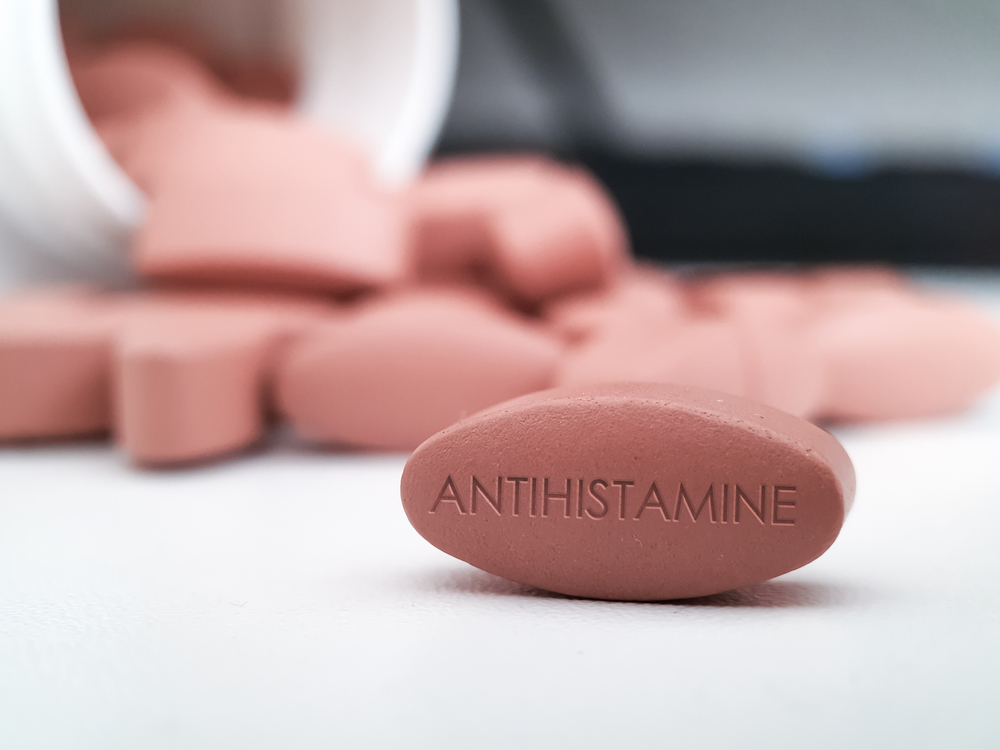Click to Skip Ahead
Dogs and humans react to environmental allergies differently. Common symptoms for humans include runny noses and sneezing, but dogs do not tend to suffer from these responses. Instead, they are more likely to have red or itchy skin, hair loss, and red eyes. Because people sometimes take allergy medications, including antihistamines, you may wonder if dogs can do the same. In short, it’s often not the most useful treatment for dogs. Read on to learn more.
What Are Antihistamines?
When the human body detects an allergen or infection, certain cells release histamine. This histamine causes allergy symptoms like a runny nose, sneezing, coughing, and wheezing. Antihistamines inhibit the production of histamines which helps combat or reduce the symptoms associated with allergic reactions. However, once an allergic reaction has started, antihistamines are no longer effective at stopping the inflammation that has been triggered.

Antihistamines for Dogs
Theoretically, dogs may benefit from antihistamines in similar ways to people. However, there are no specific antihistamines that are licensed for dogs, which means that giving the medication is considered off-label usage. Therefore, it must be prescribed by a veterinarian, to ensure it is appropriate for the dog, and to determine dosing. However, often vets will elect other medications that work better for allergies, and can suppress the inflammation once it has already started.
Speak to a Vet
As stated previously, before giving antihistamines to your dog, you should speak to your vet. They will advise whether it is the best option, and they will also be able to determine the best dosage for your dog. Inform your vet of any medications, herbal treatments, and supplements your dog is taking and they will be able to advise of any possible drug interactions that might prevent the use of antihistamines, too.
The 4 Alternative Canine Allergy Treatments
While antihistamines can work in some cases, they won’t work on all dogs for all allergies. There are alternative solutions to help combat the nasty symptoms associated with allergies in dogs.
1. Identify the Source
Try to identify what your dog is allergic to. This can be a specific food, or something in the environment. If you suspect environmental allergies, look for plants or anything your dog might come into contact with while in the house, out in the yard, or while out walking.
Some plants cause reactions when your dog brushes up against them and identifying this as the cause of a reaction will help you overcome the problem. Alternatively, you might need to speak to a vet who will be able to help identify the likely cause.

2. Elimination
Once you have identified what is causing the allergic reaction, look for ways to eliminate allergens from your dog’s life. If it is a particular perfume, swap it out for another. Similarly, if your dog is allergic to its shampoo, you might need to find an alternative. If it is coming into contact with an allergen while outside, you can try a different route or get rid of the plant in your garden.
3. Symptom Relief
Common allergic skin reactions in dogs are red skin and itchiness. Use a natural shampoo and bathe your dog. Not only will the natural shampoo help relieve itching and potentially enable your dog a little respite from the scratching, but bathing can also get rid of any allergens in the coat and prevent your dog from continuing to come into contact with whatever is causing the itching.
If you are looking for the perfect, pet-friendly shampoo and conditioner combo, we highly recommend the products by Hepper. With a soothing oatmeal shampoo, free of soaps and other harsh chemicals, and a cucumber and aloe scented conditioner, your pet's skin and coat will be smooth, hydrated, and irritation-free.
At Dogster, we’ve admired Hepper for many years, and decided to take a controlling ownership interest so that we could benefit from the outstanding products of this cool pet company!
4. Nutritional Therapy
Some foods are labeled as being anti-allergy foods. They might not combat the allergy, but they can help relieve the symptoms and make your dog feel better.
Frequently Asked Questions (FAQ)
How Quickly Do Antihistamines Work?
The speed at which antihistamines work on dogs depends on the actual drug used as well as the severity of the reaction and how much of the drug is administered. Frequently it will take a day or two to see any changes, so ask your vet what to expect.
Do Antihistamines Make Dogs Sleepy?
Antihistamines can potentially make some dogs sleepy, though this depends on the type and the dosage. Dogs generally don’t seem to be as affected as humans, in this regard. If your dog becomes lethargic, you should consult your vet so they can advise on the next steps.

Conclusion
Antihistamines bring relief to human allergy sufferers around the world. They can also, in some cases, be a potential therapy for dogs that are suffering allergic reactions, too, though many other, more effective treatments are often preferred.
If you think your dog may benefit from an antihistamine, speak to your vet to get their recommendation. Some antihistamines are not safe to give to dogs. And a vet will know whether any known drug interactions might cause a bad reaction.
Finally, they will also be able to advise on suitable dosage levels to yield results without causing any potential negative reactions in your dog.
Featured Image Credit: MDV Edwards, Shutterstock












